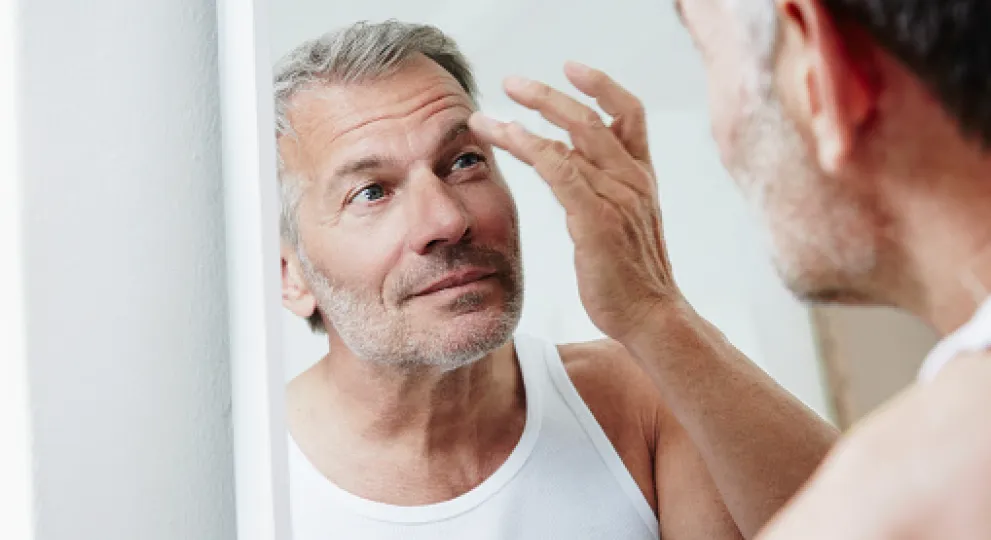Cancer can change your body. Here’s how to embrace it.
Cancer can change your body. Here’s how to embrace it.

For some, living with cancer can lead to changes in the way they look. Cancer can change your body — and, at times, also change how you feel about the way you look.
If you’re experiencing this, you should know you’re not alone. Many people with cancer experience some change in the way they look. Common changes include:
- Scarring from surgery
- Swelling, which most commonly happens in the arms and legs, but can happen anywhere
- Skin changes, including itching or dry skin
- Losing or gaining weight without trying to
- Hair loss
Of course, changes in physical appearance can affect you mentally and emotionally, too. Some surgeries, such as a mastectomy, may result in the loss of a body part, fundamentally challenging your identity and hurting your self-esteem. Different people may cope with these emotions in a variety of ways, including missing work, losing interest in social activities, and withdrawing from other people.
These physical changes — and their emotional effects — are real. They can have a huge impact on someone.
At the same time, it’s possible to accept and even embrace them over time. You may experience feelings of sadness, frustration, and anger on the way to acceptance — and that’s ok. Your feelings are real, and you have a right to them.
“I recommend patients allow themselves time to grieve the changes they are experiencing,” Nicolette M. Bernhardt, a clinical health psychologist at Northwestern Medicine who works with patients who have undergone cancer treatments that lead to changes in physical appearance, told HealthBeat, a nonprofit platform that reports on public health. “Grief applies to any loss, and it is important to work through the emotions associated with the loss associated with cancer or illness.”
Mindset can also play an important role. Joey Hubbard is Thrive Global’s Chief Training Officer and has more than 30 years of experience helping people navigate difficult emotional situations, including health challenges.
“This isn’t about vanity. It’s both natural and OK to care about your appearance,” Hubbard says. “But over time, you can shift your energy toward accepting and embracing your body as it is now, with all of its strengths and imperfections. Gradually, you may be able to move through your grief and appreciate your body and its role in helping you get healthy. A daily gratitude practice can be a powerful reframe: thanking your body and loving it for the work it’s doing to bring you back to health.”
While physical changes can be hard, there is hope: many people’s cancer journeys may lead them to a place where they not only accept but learn to love and be grateful for their new body. You may even find joy in your new appearance and see the changes you’ve gone through as reminders of your strength and resilience. And like anyone, you may have some days that are better and others that are harder.
Here are some Microsteps that may help you come to terms with physical changes while living with cancer. As always, consult with your care team for the guidance and recommendations that are best for you.
Reframing something about your body you don’t love into something you’re proud of.
If you’re having negative feelings toward your body, try sending a positive message. It might feel silly at first, but over time it may become more natural. For example, “I’m proud of my body for carrying me through each day” or “My physical changes are a reflection of my resilience.”
Spending one minute in the morning talking to yourself as though you were talking to a friend.
We can be much harder on ourselves than we’d ever be on someone we care about. Try giving yourself a simple pep talk in the mirror, with a focus on what you like about your personality or your appearance.
Consider repeating the affirmation: "Every change is a sign of my courage."
Try using this affirmation to remind yourself that the physical changes you’re going through are a representation of your strength and resilience.
Shaving your head or cutting your hair short– before hair loss begins.
If you have been told to expect hair loss, you may wish to cut your hair short or even shave your head before it happens. This may help you feel less reactive and more in control of your appearance.
Asking a friend or loved one to go wig shopping with you.
Many people who experience hair loss choose to get a wig. If you enjoy caring for and styling your hair, you may be able to channel that passion into wigs that make you feel good. Asking a loved one to come with you may make the experience of choosing a wig less daunting and more fun.
Consider using a high quality moisturizer to soothe dry or irritated skin.
Cancer treatment may cause changes to your skin including rashes, dryness, and irritation. Ask your care team what topical treatments like fragrance-free lotion you can consider trying.
Developed with Thrive Global













